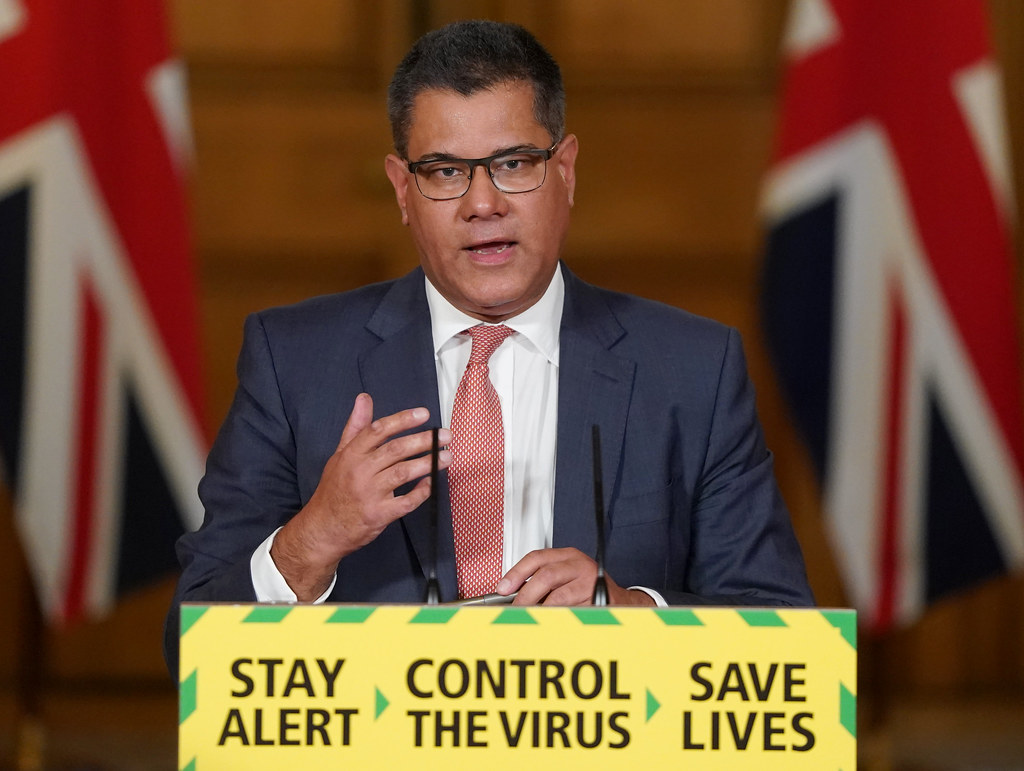Campaigners have accused the UK government of hypocrisy after ministers met with fossil fuel producers almost 150 times as they prepared to “build back greener” during the COVID-19 pandemic.
Newly released data from the Department for Business, Energy and Industrial Strategy (BEIS) shows meetings with oil and gas companies dramatically outnumbered those with renewable producers ahead of Prime Minister Boris Johnson’s “Rooseveltian” New Deal announcement.
Analysis by DeSmog shows ministers met representatives from companies including Shell, BP and ExxonMobil 149 times between April and June, the three months covered by the transparency data release. Ministers met renewable energy producers just 17 times over the same period, of which 11 meetings were with Danish power company Ørsted.
Like what you’re reading? Support DeSmog by becoming a patron today!
The revelations sparked concern among campaigners, who cited an apparent contradiction between the UK government’s net-zero target and the privileged access given to big polluters.
Anna Vickerstaff, a campaigner at 350.org, said the UK’s 2050 commitment was “meaningless when you scratch the surface and see what really lies beneath the facade: empty promises and collusion with the very polluters who have created the climate crisis.”
“The UK government is repeating rhetoric around a ‘green recovery’ but instead of taking action to match these words, they’re opening the door for fossil fuel companies to access decision-makers on a regular basis,” she said. “This level of access demonstrates hypocrisy, plain and simple.”
Privileged access
The content of the meetings is not available to the public, but government transparency information shows BEIS Secretary of State Alok Sharma and Energy Minister Kwasi Kwarteng held regular meetings with fossil fuel companies and groups to speak about COVID-19, green recovery and decarbonisation.
Kwarteng met with a group comprising of BP, Equinor, Shell, ExxonMobil, Total, Essar and Chrysaor on at least seven occasions to discuss the impact of COVID-19.
The log also reveals that in the three-month timeframe, ministers attended three one-on-one meetings with BP, four with Shell, and one each with Equinor, Drax and Total. Ministers also met 12 times with trade association Oil and Gas UK.
A BP spokesperson told DeSmog the meetings were held at the government’s request and mostly involved discussions around the response to the COVID-19 pandemic, but also the introduction of the company’s net-zero ambition.
As well as conversations on “the impact of the pandemic on supplies of oil, gas, fuel and services as well as safe workplaces”, representatives also discussed “a range of subjects including our ambition and strategy, as well as the response to the pandemic” during the one-on-one audiences, they said.
An Equinor spokesperson also defended the meetings, saying it was “natural for us to meet with the government to discuss how we can play our role in the country’s energy transition.”
They said the topics under discussion included the “impact from COVID-19, industrial decarbonisation, the oil and gas sector deal, green recovery and the Humber Industrial Cluster.”
Over the past 18 months, oil companies have announced a flurry of climate commitments to reach “net zero” by 2050. But Geoffrey Supran, Research Associate in the Department of the History of Science at Harvard University, believes fossil fuel companies are using this “outside lobbying” such as advertising and social media to allow them to pursue “inside lobbying” at government level.
“This public rhetoric and framing will be designed to complement the ‘inside lobbying’ that this data reveals, which is presumably pushing for government protection of the status quo,” he told DeSmog.
“Indeed, this intensive lobbying effort is consistent with a global trend, including specifically in the UK, of the fossil fuel industry successfully exploiting the pandemic to secure continued taxpayer handouts and bailouts.”
BEIS was recently criticised for hosting informal lunches and meetings with Equinor, Shell and BP to discuss their place at the next UN climate talks in Glasgow.
A BEIS spokesperson defended the meetings, telling DeSmog:
“As you’d expect, Ministers regularly meet with a range of organisations and business groups – including the oil and gas sector – as we all work towards a low-carbon cleaner future and build back greener from the pandemic,” adding that the UK wants to ensure it “has the most ambitious environmental programme of any country on earth.”
Climate meetings
Oil and gas companies have been heavily impacted by the COVID-19 crisis, which has led to a plummeting oil price, putting jobs in the sector at risk.
But critics suggest big polluters with an interest in preserving the high-carbon status quo are not best placed to inform government policy on a green recovery from the pandemic.
A recent report by the Trade Unions Congress (TUC) called for a “reset of the way we live and work”, with members requesting workers be at the heart of any just transition to a greener economy that puts environmental sustainability at the heart of government policy.
Renewable energy producers, green groups and climate experts were invited to speak to the government over this time period.
Trade groups the Renewable Energy Association and Renewables UK met with ministers 11 and 10 times respectively, while the government’s advisory body, the Committee on Climate Change, met ministers three times, and think tank Green Alliance met ministers twice. In total, green groups and climate experts met with ministers 65 times over the three-month period.
But Professor Kevin Anderson, Professor of Energy and Climate Change at the University of Manchester, said the imbalance in the number of meetings between low-carbon stakeholders and big polluters “shines a light on the cosy relationship between ministers and fossil fuel executives and on this government’s Machiavellian approach to climate change.”
“Ultimately it will be poorer climate vulnerable communities and our own children who will suffer the consequences of this absence of integrity,” he said.
Image credit: Number 10/Flickr CC BY–NC–ND 2.0
Subscribe to our newsletter
Stay up to date with DeSmog news and alerts







